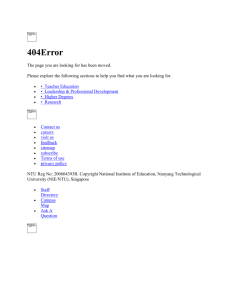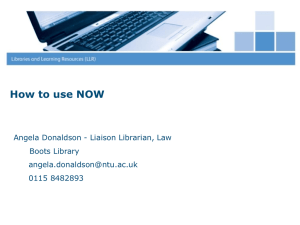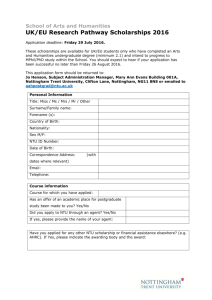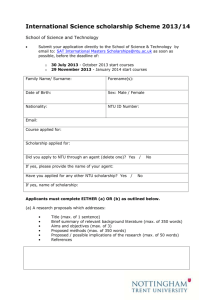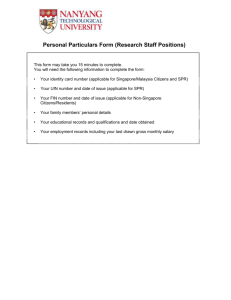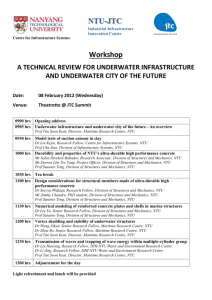Guide to NTU Professional Standards for Teaching and Supporting
advertisement
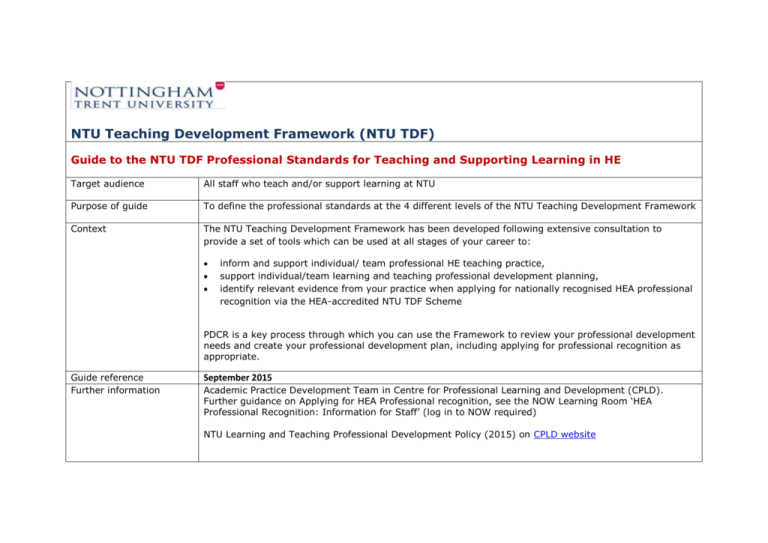
NTU Teaching Development Framework (NTU TDF) Guide to the NTU TDF Professional Standards for Teaching and Supporting Learning in HE Target audience All staff who teach and/or support learning at NTU Purpose of guide To define the professional standards at the 4 different levels of the NTU Teaching Development Framework Context The NTU Teaching Development Framework has been developed following extensive consultation to provide a set of tools which can be used at all stages of your career to: inform and support individual/ team professional HE teaching practice, support individual/team learning and teaching professional development planning, identify relevant evidence from your practice when applying for nationally recognised HEA professional recognition via the HEA-accredited NTU TDF Scheme PDCR is a key process through which you can use the Framework to review your professional development needs and create your professional development plan, including applying for professional recognition as appropriate. Guide reference Further information September 2015 Academic Practice Development Team in Centre for Professional Learning and Development (CPLD). Further guidance on Applying for HEA Professional recognition, see the NOW Learning Room ‘HEA Professional Recognition: Information for Staff’ (log in to NOW required) NTU Learning and Teaching Professional Development Policy (2015) on CPLD website Overview The NTU practice standards defined in detail in this document have been informed by, and align directly with, the national standards for teaching and supporting learning in higher education set out in the UKPSF (Higher Education Academy (HEA), November 2011 – see Figure 1 below). Areas of Activity A1 Design and plan learning activities and/or programmes of study A2 Teach and/or support learning A3 Assess and give feedback to learners A4 Develop effective learning environments and approaches to student support and guidance A5 Engage in CPD in subjects / disciplines and their pedagogy, incorporating research, scholarship and the evaluation of professional practice Core Knowledge K1 The subject material K2 Appropriate methods for teaching and learning in the subject area and at level of academic programme K3 How students learn, both generally and within their subject/disciplinary context K4 The use and value of appropriate learning technologies K5 Methods for evaluating the effectiveness of teaching K6 The implications of quality assurance and quality enhancement for academic and professional practice with a particular focus on teaching Professional Values V1 Respect individual learners and diverse learning communities V2 Promote participation in higher education and equality of opportunity for learners V3 Use evidence-informed approaches and the outcomes from research, scholarship and continuing professional development V4 Acknowledge the wider context in which higher education operates recognizing the implications for professional practice Figure 1: The UKPSF standards (HEA, November 2011) The national standards are defined in 4 levels (D1-D4) which directly align with the 4 levels of practice standards defined in the NTU Teaching Development Framework, and to HEA professional recognition awards as follows: D1 D2 D3 D4 - equivalent equivalent equivalent equivalent to to to to HEA HEA HEA HEA Associate Fellow Fellow Senior Fellow Principal Fellow and and and and Level Level Level Level 1 2 3 4 of of of of NTU NTU NTU NTU TDF) TDF) TDF) TDF) The NTU TDF practice standards are set out in this document in three parts as follows: Table 1: an overview of NTU TDF professional standards at Levels 1-4, and how they align with the UKPSF and levels of HEA professional recognition Table 2: a definition of the national professional standards D1-D3 and how they are defined in the NTU TDF Levels 1-3 Table 3: a definition of the national professional standards D4 and how they are defined in the NTU TDF Level 4 You can use the standards defined in the NTU TDF to: inform and support individual/ team professional HE teaching practice, support individual/team learning and teaching professional development planning, identify relevant evidence from your practice when applying for nationally recognised HEA professional recognition via the HEAaccredited NTU TDF Scheme (For further information on Applying for HEA Professional Recognition and guidance on evidencing these practice standards, go to the NOW Learning Room ‘HEA Professional Recognition’ listed under the Staff role on your NOW homepage.) Table 1: Overview of NTU Teaching Development Framework (NTU TDF) Professional Standards NTU TDF Levels 1 2 3 4 Overview of practice standards Staff are expected to demonstrate: A broad awareness, understanding and critical application of appropriate areas of core knowledge and professional values to inform their professional practice in at least 2 of the 5 areas of activity of the UKPSF Staff are expected to demonstrate: A broad awareness, understanding and critical application of appropriate core knowledge and professional values to inform their professional practice across all 5 areas of activity of the UKPSF Staff are expected to demonstrate: A thorough awareness, understanding and critical application of appropriate core knowledge and professional values to achieve a key impact on high quality HE teaching and learning within the team, department, or discipline across all 5 areas of activity of the UKPSF Staff are expected to demonstrate: A thorough awareness, understanding and critical application of appropriate core knowledge and professional values to achieve a sustained impact on high quality HE teaching and learning across the institution and/or sector across all 5 areas of activity of the UKPSF Alignment with the 4 levels in the UKPSF national standards Equivalent HEA level of professional recognition Descriptor 1 (D1) Descriptor 2 (D2) Descriptor 3 (D3) Descriptor 4 (D4) Staff able to demonstrate this level of standards are eligible to apply for: HEA Associate Fellow Staff able to demonstrate this level of standards are eligible to apply for: HEA Fellow Staff able to demonstrate this level of standards are eligible to apply for: HEA Senior Fellow Staff able to demonstrate this level of standards are eligible to apply for: HEA Principal Fellow Table 2: Definition of UK Professional Standards in HE (UKPSF) in the NTU TDF Levels 1-3 UKPSF Areas of Activity NTU TDF Level 1 (HEA Associate Fellow) NTU TDF Level 2 (HEA Fellow) NTU Level 3 (HEA Senior Fellow) A1 Design and plan learning activities and / or programmes of study Demonstrates effective use of: a constructive alignment approach in design of learning opportunities; relevant discipline and learning and teaching knowledge to inform the curriculum – including the learning outcomes and content; NTU academic practice policy to inform the curriculum. Demonstrate your wider impact on the design of teaching learning opportunities that: is informed appropriately by a constructive alignment approach; are informed appropriately by relevant discipline and learning and teaching knowledge; align appropriately with NTU academic practice policy. A2 Teach and/or support learning Demonstrates effective: use of methods which support the active and inclusive engagement of all learners in working to achieve the intended learning outcomes; provision of sustainable learning resources in appropriate media and academic level to support the intended learning outcomes. Demonstrate your wider impact on teaching and/or learning support practice that: uses methods which support the active and inclusive engagement of learners to achieve the intended learning outcomes; enables the provision of sustainable learning resources in appropriate media and academic level to support the intended learning outcomes. A3 Assess and give feedback to learners Demonstrates effective use of: methods which assess the intended learning outcomes appropriately; methods which help learners identify their progress and how to develop further; current NTU academic practice policy to inform own assessment and feedback practice. Demonstrates effective: awareness of equality and diversity issues in learning and teaching to create conditions which support student learning; contribution to the pastoral care of students, providing support and referring students to other colleagues and professional services as appropriate. Demonstrate your wider impact on assessment and feedback practice that: uses methods which assess the intended learning outcomes appropriately; uses methods which help learners identify their progress and how to develop further; aligns appropriately with NTU academic practice policy. Demonstrate your wider impact on teaching and learning support practice that promotes and supports: appropriate awareness of equality and diversity issues in learning and teaching to create conditions which support student learning; the effective pastoral care of students. A4 Develop effective learning environments and approaches to student support and guidance A5 Engage in CPD in subjects / disciplines and their pedagogy, incorporating research, scholarship and the evaluation of professional practice Demonstrates effective: critical evaluation of own practice to identify strengths and areas for development and how these can be addressed; active participation in ongoing learning and teaching professional development which is relevant to own role, expertise and development needs; application of learning to enhance own teaching practice. Demonstrate your wider impact on professional development of teaching and learning support practice that supports: regular critical evaluation of practice; active participation in ongoing learning and teaching professional development relevant to your and others’ role, expertise and development needs; application of learning to enhance teaching and learning support practice. Areas of Core Knowledge NTU TDF Level 1 (Associate Fellow) NTU TDF Level 2 (Fellow) NTU Level 3 (Senior Fellow) K1 The subject material Provides evidence of: using current discipline knowledge and practice when teaching and supporting learning in HE. As for Levels 1 & 2, and evidence of wider impact on those aspects in other people’s practice. K2 Appropriate methods for teaching and learning in the subject area and at level of academic programme Provides evidence of: using teaching methods which support active and inclusive learning, and are aligned appropriately to learning needs, academic levels, disciplines, and current NTU academic policy and practice. As for Levels 1 & 2, and evidence of wider impact on those aspects in other people’s practice. K3 How students learn, both generally and within their subject / disciplinary context Provides evidence of: using knowledge of the relationship between teaching and learning, and the factors which support successful independent learning generally in in own discipline, to inform own teaching practice. As for Levels 1 & 2, and evidence of wider impact on those aspects in other people’s practice. K4 The use and value of appropriate learning technologies Provides evidence of: applying your knowledge of digital and non-digital technologies and their benefits to support students’ active and independent learning; As for Levels 1 & 2, and evidence of wider impact on those aspects in other people’s practice. using NTU ‘NOW’ and associated tools to design and/or deliver more active and inclusive learning opportunities. K5 Methods for evaluating the effectiveness of teaching Provides evidence of: using an appropriate range of methods and information (including feedback) to evaluate impact of own teaching practice on students’ learning. As for Levels 1 & 2, and evidence of wider impact on those aspects in other people’s practice. K6 The implications of quality assurance and quality enhancement for academic and professional practice with a particular focus on teaching Provides evidence of: participating in NTU teaching and learning quality management processes, as appropriate to own teaching role, to inform own practice; explicit alignment of own practice to NTU Academic Standards and Policy as appropriate to own teaching role. As for Levels 1 & 2, and evidence of wider impact on those aspects in other people’s practice. Professional Values NTU TDF Level 1 (Associate Fellow) NTU TDF Level 2 (Fellow) NTU Level 3 (Senior Fellow) V1 Respect individual learners and diverse learning communities Provides evidence of: appropriate awareness of, and sensitivity to, the diverse range of individual student needs, abilities and motivations; making reasonable adjustments to own practice to help foster and support students’ active and independent learning approach, self-esteem, confidence, and ability. As for Levels 1 & 2, and evidence of wider impact on those aspects in other people’s practice. V2 Promote participation in higher education and equality of opportunity for learners Provides evidence of: recognising institutional and cultural barriers that may inhibit access to, and full participation in, higher education; using this knowledge to make own teaching practice more inclusive. As for Levels 1 & 2, and evidence of wider impact on those aspects in other people’s practice. V3 Use evidence-informed approaches and the outcomes from research, scholarship and continuing professional development Provides evidence of: engagement in regular critical evaluation, reflection, and development of own practice as part of PDCR; completion of continuing professional development and using what learned from these to enhance own teaching practice. As for Levels 1 & 2, and evidence of wider impact on those aspects in other people’s practice. V4 Acknowledge the wider context in which higher education operates recognising the implications for professional practice Provides evidence of: how own practice aligns to NTU learning and teaching strategy, policy and practice priorities, and particular issues in wider HE/HE-related sectors. As for Levels 1 & 2, and evidence of wider impact on those aspects in other people’s practice. Table 3: Definition of UK Professional Standards in HE (UKPSF) in the NTU TDF Level 4 Professionals at this level are required to be able to demonstrate: Active commitment to, and championing of all dimensions of the UKPSF as defined in the NTU TDF, through work with students and staff, and in institutional developments Successful, strategic leadership to enhance student learning, with a particular, but not necessarily exclusive, focus on enhancing teaching quality in institutional and/or international settings Establishing effective organisational policies and/or strategies for supporting and promoting others (eg through mentoring, coaching) in delivering high quality teaching and support for learning Championing, within institutional and wider settings, an integrated approach to academic practice (incorporating, for example, teaching, learning, research, scholarship and administration etc.) A sustained and successful commitment to, and engagement in, continuing professional development related to academic, institutional and/or other professional practices. Indicative practice examples: o Leading institutional academic practice development projects o Strategic championing of key academic development policies and practice development onto strategic agendas, leading their implementation and evaluation o Significant contributions to organisational development in relation to learning and teaching o Significant contributions to Institutional policy development and implementation o Commissioning new programmes and education opportunities to address new or changing market trends o Sustained and sector / discipline contribution as an external examiner and/or external verifier CPLD September 2015
